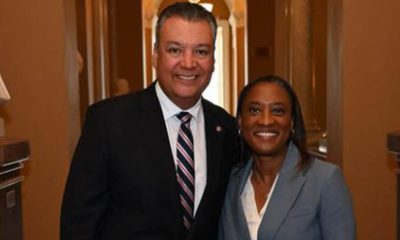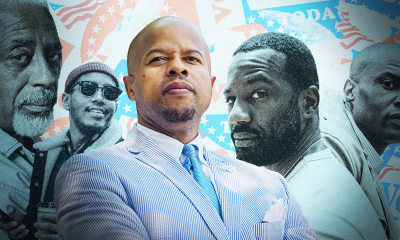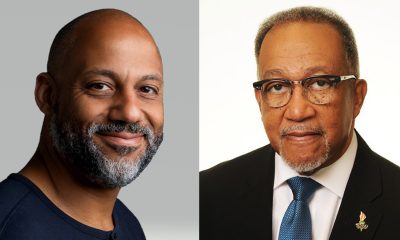Politics
Diminished in Congress and Many States, Dems Weigh Future

In this Dec. 2, 2014 file photo, Vice President Joe Biden administers the Senate oath to Sen. Brian Schatz, D-Hawaii during a ceremonial swearing-in ceremony in the Old Senate Chamber on Capitol Hill in Washington. (AP Photo/Susan Walsh, File)
CHARLES BABINGTON, Associated Press
ANDREW TAYLOR, Associated Press
WASHINGTON (AP) — Congressional Democrats are in retreat in more ways than one this week.
As Democratic senators gather in Baltimore to talk strategy and lick election wounds, their party faces diminished powers in Congress, GOP dominance in many states and a shrinking pool of potential candidates for future elections.
In the November elections, Democrats lost their eight-year Senate majority, and saw their House numbers fall to the lowest level in seven decades.
In the states, Republicans will hold 31 governorships, and more state legislative seats than they’ve had since 1928. It especially vexes Democrats to see Republicans dominate the U.S. House delegations and the state governments in several states that President Barack Obama won, including huge legislative majorities in Florida, Michigan, Ohio and Wisconsin.
“I think there’s a lot of frustration,” said Rep. John Yarmuth, a Kentucky Democrat who said the party has “failed to do something that I think represents an opportunity for us. We really haven’t talked to the American people about what government does for them.”
The big gap between Democratic success at the presidential level and elsewhere “is a real dilemma, I think, for democracy really, not just the Democratic Party,” said Rep. David Price of North Carolina, a 14-term congressman and former Duke University political scientist. He said Ohio, Michigan, Pennsylvania, North Carolina and Virginia display the “most egregious” examples of gerrymandered districts for congressional and state legislative races.
This long-practiced brand of partisan map-making, Price said, helps Republicans control the legislatures of states that vote Democratic for president. But in a sign of local Democrats’ struggles to change voters’ minds, Price said the best prospect for reversing the trend — in the South, at least — is in lawsuits that allege racial bias in the way Republicans drew district boundaries.
Obama’s veto power, plus Democratic senators’ ability to block some bills with filibusters, will limit GOP success in Congress over the next two years. Meanwhile, congressional Democrats are limiting their ambitions and hoping for at least a partial thaw in partisan gridlock.
Democratic Sen. Mark Warner of Virginia said he hopes both parties will move beyond campaign rhetoric and “get to a point where we can actually move the ball on some issues.” He pointed to a series of events this year “that could actually see breakthroughs or another breakdown, from the debt ceiling to Social Security disability to infrastructure.”
Congressional Republicans will naturally take credit for any legislative achievements, Warner said. However, he said, “a functioning government, when you’ve got a Democratic president, actually still helps Democrats.”
Many Democrats say the party needs to sharpen its messaging. They note that voters in several states last fall approved referendums to raise the minimum wage, and simultaneously ousted Democratic senators who backed the proposals.
“We believe we’re on the right side of the issues, and all we can do is keeping making the case,” Yarmuth said. “Hopefully we’ll get better at that.”
House Democratic Leader Nancy Pelosi of California on Tuesday announced a new messaging team led by Steve Israel, D-N.Y. “We need a message,” Israel said. “An effective message doesn’t tell voters what to think. It builds on what they feel.”
Democratic Sen. Tim Kaine of Virginia said Democrats must do a better job of highlighting economic improvements and a dramatic increase in energy production under Obama’s watch. They should talk about initiatives, such as a higher minimum wage, and better training for workers, not as government programs but as common-sense ways to help workers, he said.
“We’re not battling to increase government,” Kaine said, “we’re battling to help everyday people.”
Some Democrats note that their congressional leaders have been around for decades, and don’t personify fresh ideas. The House’s top three Democratic leaders —Pelosi, Steny Hoyer and James Clyburn — are in their mid-70s. So is Senate Democratic Leader Harry Reid.
More troubling to Democrats is Republican dominance of local politics in states that are competitive in presidential and Senate races.
Obama carried Florida, Michigan, Ohio, Pennsylvania and Virginia twice, and North Carolina once. Yet Republicans hold big majorities in these states’ legislative chambers, except Virginia, where their Senate majority is narrow.
Of the 99 U.S House seats in these six states, Democrats hold 30.
These discrepancies can’t be blamed entirely on gerrymandering, said Steve Schale, a top Florida Democratic strategist. Too often, he said, “we’ve done a lousy job of recruiting candidates” at all levels. Strong candidate recruitment — starting with mayors and state legislatures — builds a farm team of potential candidates for governor and Congress, Schale said.
“We’ve gotten away from a lot of that basic blocking and tackling,” he said. He said the November election of Democratic Rep. Gwen Graham — who ousted a Republican House member from the Tallahassee area — proves that a well-funded and articulate Democrat can prosper even in a strong GOP year.
Presidential politics remain the Democrats’ brightest spot. They’ve won the popular vote in five of the last six presidential races, and they have high hopes for a 2016 field that could feature Hillary Rodham Clinton.
Still, some Democrats worry that Clinton might come across as a stale, too-familiar politician. If Republicans nominate Jeb Bush or Mitt Romney, however, that issue might be negated.
Price predicts Republican lawmakers will turn off moderate voters by placating conservative hard-liners.
“We see the most extreme elements of the conference getting their wish list,” Price said. That gives Democrats a natural opening with “more reasonable and more moderate voters,” he said.
“The tea party agenda is energizing,” he said, “believe me.”
Copyright 2015 The Associated Press. All rights reserved. This material may not be published, broadcast, rewritten or redistributed.
Alameda County
Board of Supervisors Accepts Certification of Signatures, Will Schedule Recall Election May 14
The Alameda Board of Supervisors unanimously accepted the certification of the results of the valid signatures submitted for the recall of District Attorney Pamela Price on Tuesday evening. The Board will set the election date at a special meeting on May 14. Before the meeting, recall proponents and opponents held separate press conferences to plead their cases to the Board and residents of Alameda County.
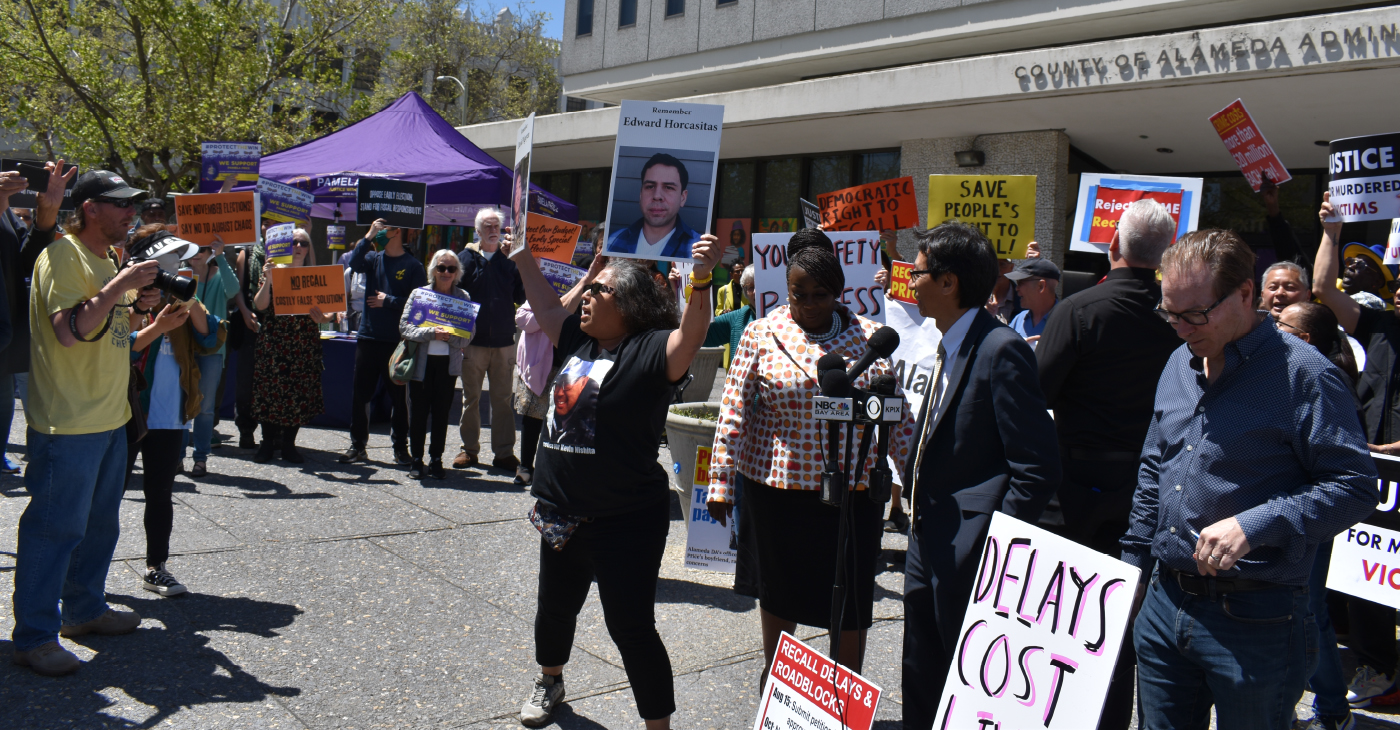
By Magaly Muñoz
The Alameda Board of Supervisors unanimously accepted the certification of the results of the valid signatures submitted for the recall of District Attorney Pamela Price on Tuesday evening. The Board will set the election date at a special meeting on May 14.
Before the meeting, recall proponents and opponents held separate press conferences to plead their cases to the Board and residents of Alameda County.
Price, who up until this point has made little public comment about the recall, held her press conference in Jack London to announce that the California Fair Political Practices Commission has opened an investigation into the finances of the Save Alameda For Everyone (SAFE) recall campaign.
The political action committee (PAC), Reviving the Bay Area, has been the largest contributor to the SAFE organization and has allegedly donated over half a million dollars to the recall efforts.
“Between September 2023 and November 2023, [Revive the Bay Area] donated approximately $578,000 to SAFE without complying with the laws that govern all political committees in California,” Price said.
Price accused the recall campaigns of using irregular signature-gathering processes, such as paying gatherers per signature, and using misleading information to get people to sign their petitions.
SAFE held their own press conference outside of the Alameda County Administration Building at 1221 Oak St. in Oakland, once again calling for the Board to certify their signatures and set a date for the recall election.
Their press conference turned contentious quickly as Price’s “Protect the Win” supporters attempted to yell over the SAFE staff and volunteers. “Stop scapegoating Price” and “Recall Price” chants went on for several moments at a time during this event.
Families of victims urged the Board to think of their loved ones whose lives are worth much more than the millions of dollars that many opponents of the recall say is too much to spend on a special election.
The Registrar of Voters (ROV) estimates the special election could cost anywhere from $15 to $20 million, an amount that is not in their budget.
The Board was presented with several options on when and how to conduct the recall election. They have to set a date no less than 88 days or more than 125 days after May 14, meaning the date could fall anywhere from late July to September.
But the County charter also states that if a general election takes place within 180 days of their scheduling deadline, the Board could choose to use the November ballot as a way to consolidate the two events.
In the event that Price is recalled, the Supervisors would appoint someone to fill the vacancy, though neither the County nor the California charter specifies how long they would have to pick a replacement.
The appointee would serve as district attorney spot until the next election in 2026. Afterwards, either they, if they run and win, or a newly elected candidate would serve the rest of Price’s six-year term until 2029. Price is unique as the only district attorney wo serves a term of six years.
The Board acknowledged that they knew last fall that this recall would come with its own set of complications when Measure B, which changed the local recall charter to match California’s, was first brought to their consideration.
Supervisors Nate Miley and David Haubert opposed discussing the measure, stating that the public would think that the Board was attempting to influence the recall campaign that had already taken off months prior.
“I think ultimately this feels like it’s going to end up in court, one way or the other, depending on who files what,” Haubert said.
Price’s legal team told the Post that the district attorney intended to consider all legal options should the recall election take place.
Miley stated that while he was in support of the amendment to the charter, he did not think it was right to schedule it for the March ballot as it would ultimately cause confusion for everyone involved.
“It has produced some legal entanglements that I think, potentially, could’ve been avoided,” Miley said.
Commentary
Opinion: Lessons for Current Student Protesters From a San Francisco State Strike Veteran
How the nation’s first College of Ethnic studies came about, bringing together Latino, African American and Asian American disciplines may offer some clues as to how to ease the current turmoil on American college campuses over the Israel-Hamas war. After the deadline passed to end the Columbia University encampment by 2 p.m. Monday, student protesters blockaded and occupied Hamilton Hall in a symbolic move early Tuesday morning. Protesters did the same in 1968.

By Emil Guillermo
How the nation’s first College of Ethnic studies came about, bringing together Latino, African American and Asian American disciplines may offer some clues as to how to ease the current turmoil on American college campuses over the Israel-Hamas war.
After the deadline passed to end the Columbia University encampment by 2 p.m. Monday, student protesters blockaded and occupied Hamilton Hall in a symbolic move early Tuesday morning.
Protesters did the same in 1968.
That made me think of San Francisco State University, 1968.
The news was filled with call backs to practically every student protest in the past six decades as arrests mounted into hundreds on nearly two dozen campuses around the country.
In 1970, the protests at Kent State were over the Vietnam War. Ohio National Guardsmen came in, opened fire, and killed four students.
Less than two weeks later that year, civil rights activists outside a dormitory at Jackson State were confronted by armed police. Two African American students were killed, twelve injured.
But again, I didn’t hear anyone mention San Francisco State University, 1968.
That protest addressed all the issues of the day and more. The student strike at SFSU was against the Vietnam war.
That final goal was eventually achieved, but there was violence, sparked mostly by “outside agitators,” who were confronted by police.
“People used the term ‘off the pigs’ but it was more rally rhetoric than a call to action (to actually kill police),” said Daniel Phil Gonzales, who was one of the strikers in 1968.
Gonzales, known as the go-to resource among Filipino American scholars for decades, went on to teach at what was the positive outcome of the strike, San Francisco State University’s College of Ethnic Studies. It’s believed to be the first of its kind in the nation. Gonzales recently retired after more than 50 years as professor.
As for today’s protests, Gonzales is dismayed that the students have constantly dealt with charges of antisemitism.
“It stymies conversation and encourages further polarization and the possibility of violent confrontation,” he said. “You’re going to be labeled pro-Hamas or pro-terrorist.”
That’s happening now. But we forget we are dealing not with Hamas proxies. We are dealing with students.
Gonzales said that was a key lesson at SF State’s strike. The main coalition driving the strike was aided by self-policing from inside of the movement. “That’s very difficult to maintain. Once you start this kind of activity, you don’t know who’s going to join,” he said.
Gonzales believes that in the current situation, there is a patch of humanity, common ground, where one can be both pro-Palestine and pro-Israel. He said it’s made difficult if you stand against the belligerent policies of Benjamin Netanyahu. In that case, you’re likely to be labeled antisemitic.
Despite that, Gonzales is in solidarity with the protesters and the people of Gaza, generally. Not Hamas. And he sees how most of the young people protesting are in shock at what he called the “duration of the absolute inhumane kind of persecution and prosecution of the Palestinians carried out by the Israeli government.”
As a survivor of campus protest decades ago, Gonzales offered some advice to the student protesters of 2024.
“You have to have a definable goal, but right now the path to that goal is unclear,” he said.
About the Author
Emil Guillermo is a journalist and commentator. A veteran newsman in TV and print, he is a former host of NPR’s “All Things Considered.”
Community
Gov. Newsom, Attorney General Bonta Back Bill to Allow California to Host Arizona Abortion Care
Gov. Gavin Newsom and Attorney General Rob Bonta announced last week that they are backing a bill introduced by the state legislative women’s caucus that would allow Arizona-based doctors to provide abortion care in California to patients from Arizona. Senate Bill (SB) 233 was authored in response to the Arizona Supreme Court’s decision on April 9 that an 1864 ban on abortion in the state is enforceable.
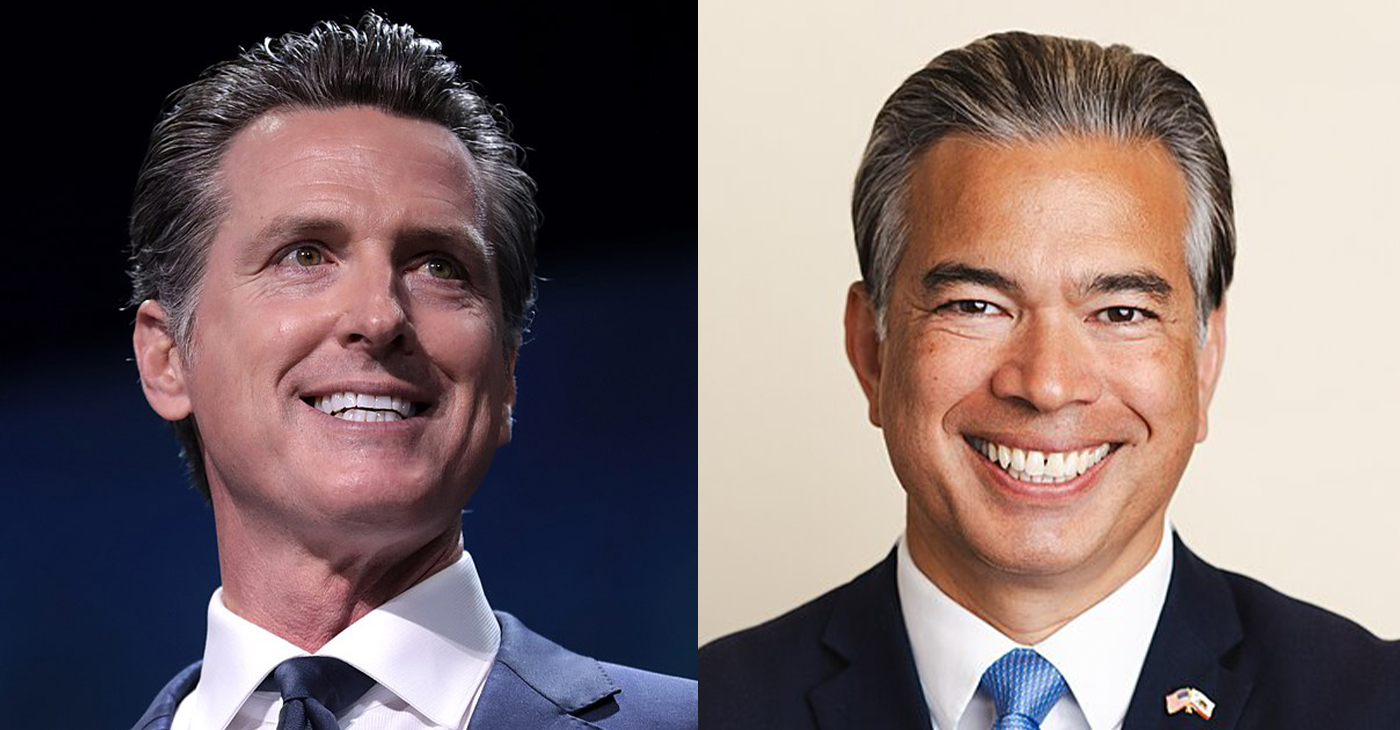
By California Black Media
Gov. Gavin Newsom and Attorney General Rob Bonta announced last week that they are backing a bill introduced by the state legislative women’s caucus that would allow Arizona-based doctors to provide abortion care in California to patients from Arizona.
Senate Bill (SB) 233 was authored in response to the Arizona Supreme Court’s decision on April 9 that an 1864 ban on abortion in the state is enforceable. The bill also aims to counter growing support for anti-abortion legislation in states with Republican-majority legislatures since Roe v. Wade was overturned, according to supporters.
“California will not sit idly by. We’re urgently moving legislation to allow Arizona doctors to provide safe and reliable reproductive care to Arizonans here in California,” Newsom said.
Sen. Nancy Skinner (D-Berkeley), chair of the California Legislative Women’s Caucus said that abortion bans are based on laws that set women back to a time when they had limited human rights.
“Anti-abortion forces have resurrected a dead law passed at a time when women couldn’t vote and husbands beating their wives was lawful,” Skinner said.
On April 24, the Arizona House of Representatives voted to repeal the 1864 abortion ban. It now moves to the Arizona Senate for deliberation.
-

 Community2 weeks ago
Community2 weeks agoFinancial Assistance Bill for Descendants of Enslaved Persons to Help Them Purchase, Own, or Maintain a Home
-

 Activism4 weeks ago
Activism4 weeks agoOakland Post: Week of April 3 – 6, 2024
-

 Business3 weeks ago
Business3 weeks agoV.P. Kamala Harris: Americans With Criminal Records Will Soon Be Eligible for SBA Loans
-

 Activism3 weeks ago
Activism3 weeks agoOakland Post: Week of April 10 – 16, 2024
-

 Community3 weeks ago
Community3 weeks agoAG Bonta Says Oakland School Leaders Should Comply with State Laws to Avoid ‘Disparate Harm’ When Closing or Merging Schools
-

 Community2 weeks ago
Community2 weeks agoOakland WNBA Player to be Inducted Into Hall of Fame
-

 Community2 weeks ago
Community2 weeks agoRichmond Nonprofit Helps Ex-Felons Get Back on Their Feet
-

 Community2 weeks ago
Community2 weeks agoRPAL to Rename Technology Center for Retired Police Captain Arthur Lee Johnson


